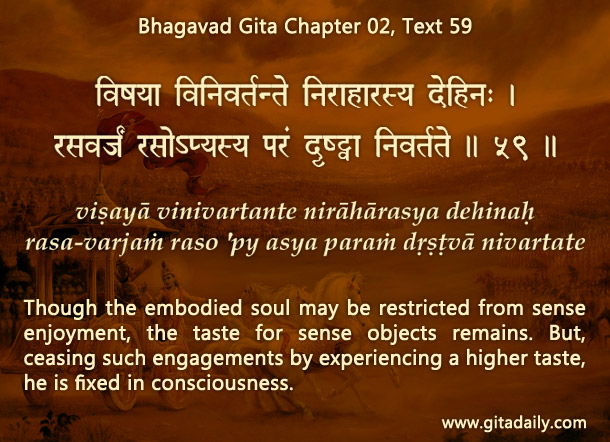Biological hunger refers to the body’s call for food, whereas sensual hunger refers to the senses’ craving for sense objects. The Bhagavad-gita (02.59: niraaharasya) uses the hunger metaphor for referring to such sensual craving. Just as when we don’t get food, we feel incomplete, agitated and restless, so too do we feel when we don’t get sense objects.
The two hungers differ significantly, however. Biological hunger arises from need – food is necessary for survival. But sensual hunger arises from greed – sense objects seem necessary, but they aren’t; we won’t die without them. Thus, sensual hunger is a pseudo-hunger, so it can never be satisfied. When we try to satisfy it by indulging in sense gratification, we get a brief relief, even pleasure. But that feeling is misleading, akin to the temporary decline in a fire after the addition of fuel. Once the fuel starts burning, the fire grows bigger. Similarly, our indulgence acts like fuel for the fire of desire – pacification is soon overrun by aggravation, by the kindling of stronger desire for greater indulgence.
Thus, sensual hunger can never be satisfied, but neither can it be entirely suppressed. Why? Because it is a distorted expression of our innate need for happiness, a need that can’t be permanently denied, for we can’t live without happiness. But that need can be permanently redirected from matter to spirit – the same Gita verse (02.59: param drshtva nivaratate) indicates that when we perceive higher spiritual reality, the craving gradually subsides and we get lasting peace.
For such spiritual redirection of consciousness, the Gita (02.61) recommends Krishna as the best object for contemplation. When we train ourselves to fix our consciousness on him, our senses become not just controlled (samyamya), but also conquered (vashe), thus letting us steadily march towards him for attaining everlasting spiritual fulfillment.

Explanation of article:
Podcast

Hare Krishna!!
Very nice explanation of the verse Prabhuji.
Thanks.